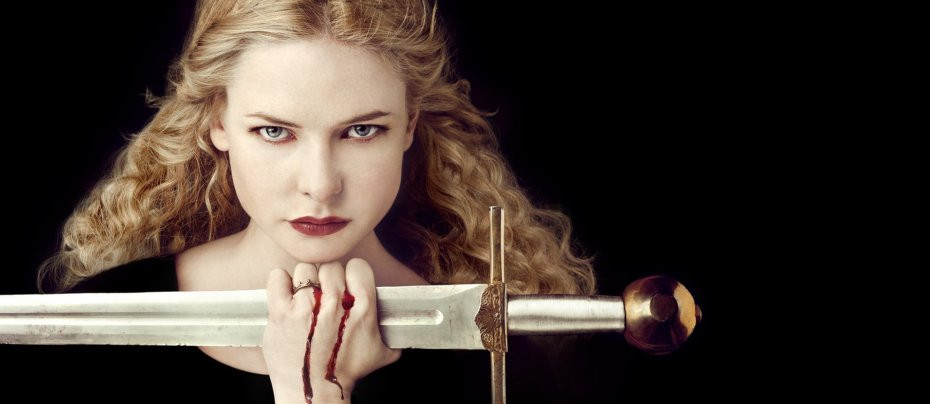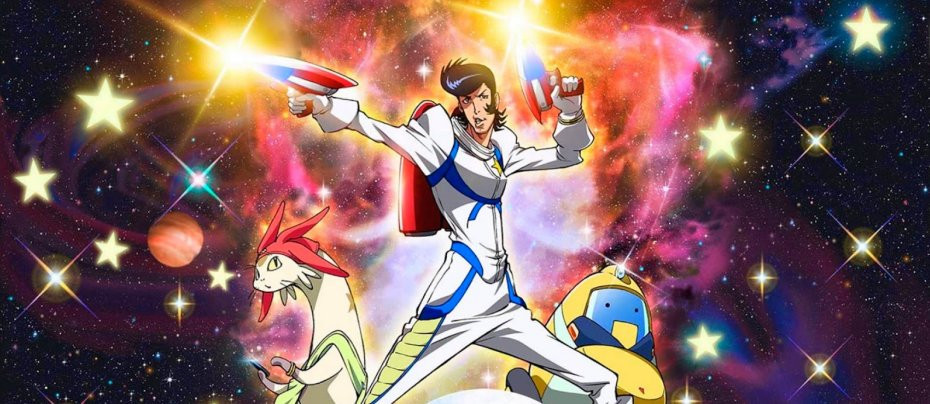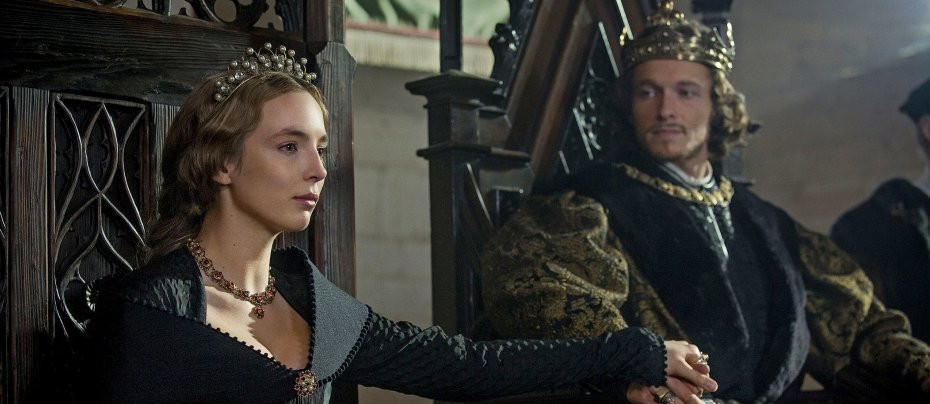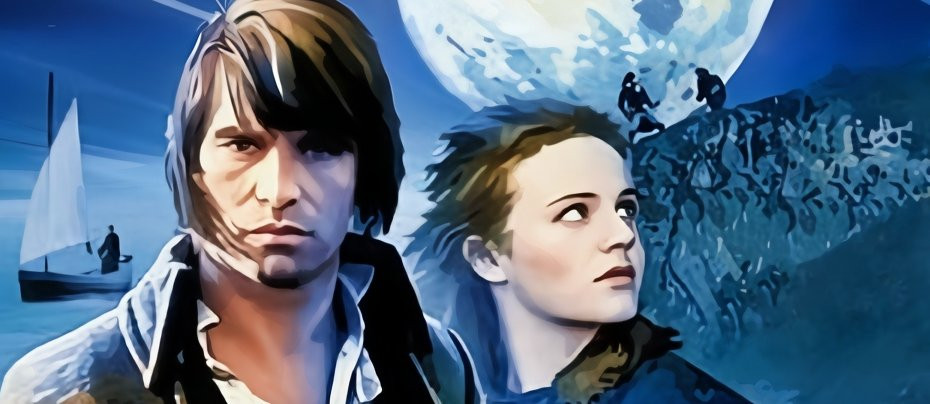
Marco Polo (2)
2014 - United StatesReview: John Winterson Richards
The Netflix series Marco Polo is a thing of many contradictions. Intended as a prestige project, it was mauled by critics and cancelled after two seasons, Netflix having lost $200,000,000 on the project, or so it is claimed. Given the Netflix business model, it is strange that they could put such a figure on it. One wonders if the Weinstein Company, which produced it, added some of their, er, legal overheads to the bill...
Apparently not. Whatever else one says about Marco Polo, the money is obviously there on the screen - expensive looking CGI, sets, costumes, extras, location work, the lot - and it seems that viewers, such as there were, appreciated it. The show retains a high 80% rating on IMDb, which is owned by Amazon, the main rival to Netflix. It also has a high customer rating on Amazon's own website, which must be slightly galling for them, even if their pain is mitigated by a cut of the DVD sales.
On the whole, the production deserves that approval. So how does one explain the contradiction between high customer satisfaction and commercial - and critical - disaster?
Although the generation now running Hollywood has a sincere respect for Asian cinema, "East Meets West" projects in general have a disappointing history. Features like 'Dragon Blade' and 'The Great Wall' have demonstrated that spectacle alone is not enough to bridge the gap between different storytelling traditions.
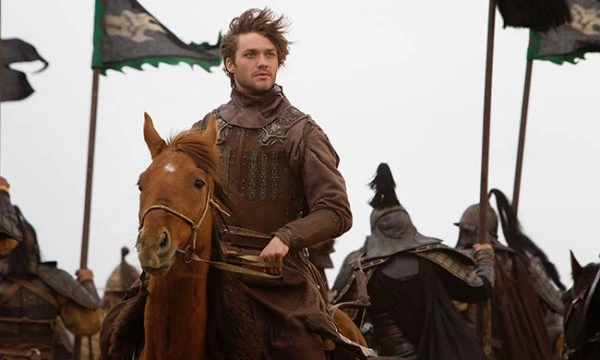
Marco Polo's account of his journey from Venice to China and back has often been thought the best hope for doing so. For one thing, it happens to be true ...mostly ...sort of ...probably. Although the book he dictated sometimes reads a bit like 'Gulliver's Travels,' which may have been modelled on it, modern scholars keep finding details that he got surprisingly right. A sensible conclusion may be that he did and saw what he says, but was not above exaggeration. This was, after all, a man given the nickname "Marco the Million" when he got back to Venice.
His book has been adapted several times, including a full Hollywood feature with Gary Cooper, no less, as an unlikely young Venetian. A creditable television miniseries is best remembered for its Morricone score and guest slots by the likes of Leonard Nimoy, Denholm Elliot, and Burt Lancaster, no less, as Pope Gregory X. A 2007 "television movie" cast Brian Dennehy as Kublai Khan - not something that would be done these days, despite him being the best thing in it.
The problem with adapting Polo's book is that its greatest asset is its greatest weakness, that it is, more or less, non-fiction. Marco made a long journey with his father and uncle, looked around a bit, won the favour of Kublai Khan, and came home. That is it - a travelogue, not a story.
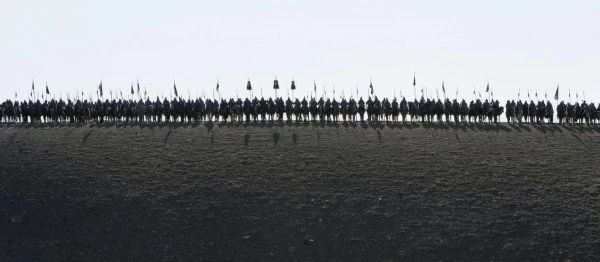
It is therefore a dramatic necessity to pad it a bit, to make Marco an active participant in events about which he only heard. All versions do this and there is no shame to it. The writers of the Netflix Marco Polo added their own clever touch, an ingenious thread of psychological drama. Their Marco has a desperate need for paternal affection, having felt abandoned as a child because his itinerant merchant father was off on a previous great journey. Tagging along with his father against the latter's express orders, he finds himself abandoned by him for real at the Court of the mighty Kublai Khan - who, in Marco's eyes, becomes a sort of substitute father.
This strange, complex false father-son relationship between the two is at the heart of Marco Polo. If it does not always come through as powerfully as it might, that is partly because of the failings of the way the whole thing is put together, of which more in a moment, and partly because Lorenzo Richelmy, a handsome Italian with a hint of the young Gian Maria Volonte about him, while perfectly adequate, is not particularly memorable as Marco.
Indeed, if the commercial failure of Marco Polo can be assigned to a single cause, it is the inexplicable decision not to spend some of the huge sums allocated to the project on some big name actors, if only in cameos, to hook the viewers in the first season. Not to do so was financial illiteracy in Hollywood terms. Realising their error, the producers drafted in Gabriel Byrne and Michelle Yeoh in the second season, but their roles were rather obvious bolt-ons and, in any case, by that time it was too late.
In the beginning, the only face even vaguely familiar to most British viewers was the Mancunian character actor Benedict Wong, probably best remembered for his guest role as the Morpheus-like Prime in the 'Countdown' episode of The IT Crowd.
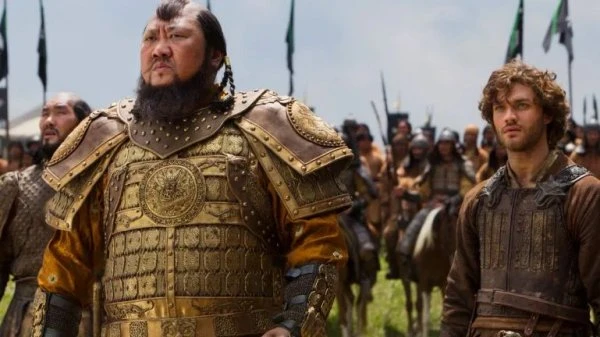
Wong's casting turns out to be one of those rare perfect meetings of actor and role. His performance as Kublai Khan is enough on its own to make it worthwhile to watch all twenty episodes of Marco Polo, plus a half hour prequel that served as a sort of extended trailer for the second season. It is simply one of the best studies of the psychological nature, cause and effect, of absolute political power in any medium ...ever.
Kublai is himself a man of many contradictions - both in history and as played by Wong: a barbaric Mongol Khan and a civilised Chinese Emperor; a man capable of ordering the most horrible crimes, and commiting them with his own hand, who nevertheless retains Marco's love and the viewer's sympathy; the personification of power and a man in a constant state of fear because he knows others, including those closest to him, want that power.
Imposing in bulk, and apparently channelling the mature Orson Welles in both manner and speech pattern, Wong's Kublai is the ultimate authority figure. He gets away with some truly monstrous things, mainly because he is Kublai Khan but also because he is not in fact a monster. He is very much a human being, and a remarkably vulnerable one at that, a point that comes across well in some surprisingly tender scenes with his Empress (Joan Chen, also great, as usual). They are an odd couple, ruthless but bound tightly by the fact that they are riding the tiger together. They might even love each other - a bit - the ambiguity is tantalising.
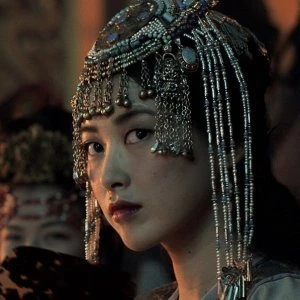
The positive aspect of casting on the basis of ability rather than brand name is, of course, that the players are nearly all of a high standard and well suited to their roles. It is almost inevitable that Tom Wu stands out most in the showy part of "Hundred Eyes," Kublai's martial arts specialist. His scenes with Michelle Yeoh are required viewing for kung fu fans.
The fight scenes in general are the highlights of the production, as one would expect, given that the use of martial arts is probably what attracts Western producers most about Asian cinema. Since executive producer and writer John Fusco has a strong personal interest in the subject, it is no surprise that Marco Polo seems to have invested heavily in this side of the production, and it pays off in some outstanding action sequences.
Indeed, the investment in almost every department achieves what is required in this sort of project, a true sense of the Epic - even if there seems to be a slight falling off in production values in the second season as it appears that belts began to be tightened in response to the poor reception of the first. We get the full treatment of Mongol Hordes, mighty walled cities, and gorgeous palaces, at least in the first season: there are a lot more tents in the second. It comes as a surprise that it was not, in fact, filmed in China. Everything looks credible.

It is therefore doubly disappointing that, having shot all this expensive footage, the directors put it together so poorly. The story is often unclear and events sometimes appear to be shown out of sequence.
Since the directing team includes some accomplished names, perhaps the problem lies with the scripts. The first season takes some historical liberties - for example, the trebuchet was introduced to the Mongols by Iraqi engineers, not our hero, Marco - but that sort of thing is dramatically justifiable. The second season, however, while based on the genuine historical event of the fall of Ahmad Fanakati, Kublai's Minister of Finance, goes completely bonkers.
It becomes a giant conspiracy, with, as so often in recent television productions, Christians as villains. Pope Gregory X (Byrne) somehow manages to raise a Crusader army at short notice and, apparently, teleport it across to Mongolia, thereby negating the whole point of Marco's book that it was a long and difficult journey considered so remarkable as to be worth recording. Incidentally, there were indeed many Mongol Christians, including Kublai's own mother, but they were mainly of the Nestorian Church and had nothing to do with the Pope. The real Gregory saw Kublai as a potential ally against the rising power of the Muslim Sultan Baibars - precisely because he had no convenient Crusader army to hand, let alone one to spare for teleportation to Mongolia.
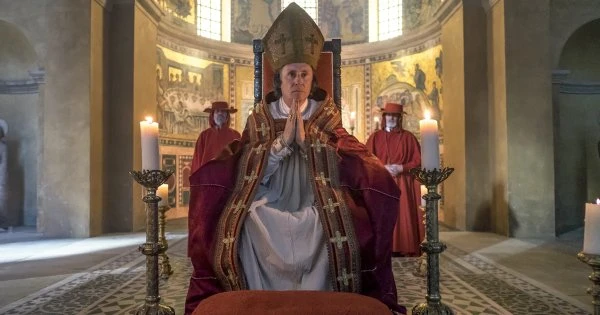
The final episode ends with the apparent arrival of the fictitious Prester John, a Christian King in a Medieval fable that had no basis in fact, with another army out of nowhere. It is probably just as well that cancellation euthanized the series at that point while it still had some dignity left.
Seen this show? How do you rate it?
Seen this show? How do you rate it?
Published on February 6th, 2020. Written by John Winterson Richards for Television Heaven.






